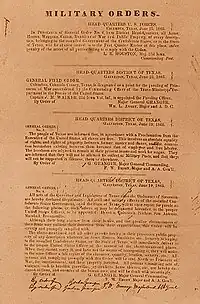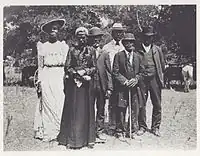Juneteenth
See also: juneteenth
English
WOTD – 19 June 2020
Etymology

A sheet of military orders containing General Order No. 3 of June 19, 1865, issued by General Gordon Granger. It begins: “The people of Texas are informed that, in accordance with a Proclamation from the Executive of the United States, all slaves are free. [...]”

Participants in a Juneteenth celebration in 1900.
Blend of June + nineteenth,[1] commemorating the anniversary of June 19, 1865, when Union Army General Gordon Granger (1821–1876) issued General Order No. 3 in Galveston, Texas, to enforce President Abraham Lincoln’s Emancipation Proclamation of September 22, 1862. The General Order stated that all previously enslaved people in Texas were now free.
Pronunciation
- (Received Pronunciation) IPA(key): /ˌd͡ʒuːnˈtiːnθ/
Audio (Southern England) (file) - (General American) IPA(key): /ˌd͡ʒunˈtinθ/
Audio (GA) (file) - Rhymes: -iːnθ
- Hyphenation: June‧teenth
Proper noun
Juneteenth (countable and uncountable, plural Juneteenths)
- (US) Also more fully as Juneteenth Day: the United States national holiday commemorating the end of slavery, observed on June 19.
- Synonyms: Black Independence Day, Emancipation Day, Freedom Day, Jubilee Day
- 1891 June 25, “Local news”, in Brenham Weekly Banner, volume XXVI, number 26, Brenham, Tex.: J[ohn] G. Rankin, →OCLC, page [7], column 1:
- There was[sic – meaning were] not so many colored people in the city as usual on Saturday evening, all of them, very near, being out at the "Juneteenth siliibration."
- 1912 June 15, “Watermelons are Moving”, in Fruit Trade Journal and Produce Record, volume XXXXVII, number 10, New York, N.Y.: Fruit Trade Journal Company, →OCLC, page 12:
- If there is plenty of sunshine within the next ten days there will be sufficient supply of watermelons in Southwest Texas to take care of the "Juneteenth" celebrations of San Antonio's colored population.
- 1921, Julia Walcott Hoffman, chapter I, in Pearl o’ Great Price or A Woman’s ’Sperience, Chicago, Ill.: Gift and Music Shop, →OCLC, page 11:
- "'Twere Juneteenth day," she began reverentially, "when my light firs' broke. The darkies all bunched up down in the live oak grove were a-singin' an' a-dancin', 'spressin' their glory 'cause they warnt no mo' slaves nohow.["]
- 1922, Hubert Anthony Shands, chapter VIII, in White and Black, New York, N.Y.: Harcourt, Brace and Company, →OCLC, page 50:
- "But whut if it rains?" asked Josy. "It always do rain on Juneteenth." / "Dat's jes' de way of it," said John. "Someone is always a-th'owin' cold water on eve'ything I does."
- 1925, J. Frank Davis, “Episode I. Juneteenth and Joada”, in Almanzar Evarts, Hero, Macon, Ga.: J. W. Burke Company, →OCLC, pages 13–14:
- He had invited her to attend the Juneteenth picnic as his guest all day. And now he had done something that never, in all his life, had he heard of any colored boy doing before—planned an expensive outing right on the eve of the big annual event. [...] "Juneteenth"—white people also pretty generally use the phrase—is their Emancipation Day, and it is the one day in the year when every Caucasian is supposed to consider the comfort and enjoyment of his negro friends ahead of his own.
- 1932, J[ohn] Mason Brewer, “Juneteenth”, in J[ames] Frank Dobie, editor, Tone the Bell Easy (Publications of the Texas Folk-lore Society; no. 10), Austin, Tex.: Texas Folk-lore Society, →OCLC, pages 8–54:
- Truck drivers, business men, and school teachers belonging to the racial group have told me tales, but the best of tale-tellers has been some ex-slave buoyed up by the spirit of a Nineteenth of June celebration—the "Juneteenth"—the day on which all colored people in the South commemorate the freedom of their race from slavery. The significance of the day is so great and the tales I have collected are so bound up with the legalized slavery which, in 1865, this day put an end to, that I have used Juneteenth as a title. Nobody who does not understand a Juneteenth celebration can ever understand the Negro or his songs and tales.
- 1940, Writers’ Program, Work Projects Administration, Texas, “Folklore and Folkways”, in Texas: A Guide to the Lone Star State (American Guides Series), New York, N.Y.: Hastings House, published 1943, →OCLC, part I (Texas: Yesterday and Today), page 97:
- The annual celebration by Negroes of June 19—the day when emancipation from slavery became effective in the State [...]—is general; few Texas Negroes would consider working on "Juneteenth" if it can be avoided. The holiday is generally observed by a picnic at which everyone eats, dances and sings to his heart's content.
- 1987, William H. Wiggins, Jr., “Following the Freedom Trail”, in O Freedom!: Afro-American Emancipation Celebrations, Knoxville, Tenn.: University of Tennessee Press, published 2000, →ISBN, page 5:
- As I chewed on my extra-hot barbecue sandwich, Mr. Artis Lovelady, the vendor and celebration sponsor, explained why he was having a Juneteenth observance: "I just wanted to do something, just wanted to kinda bring back old times and let the younger people see what we used to do to celebrate it on account of our Emancipation Proclamation."
- 1991, Michael Kammen, “The Civil War Remembered—but Unreconciled”, in Mystic Chords of Memory: The Transformation of Tradition in American Culture, 1st Vintage Books edition, New York, N.Y.: Vintage Books, published February 1993, →ISBN, part 2 (Circa 1870 to 1915), page 122:
- But what they [black people] chose to emphasize by means of traditional activities each year was the memory of gaining freedom. Consequently in African-American communities, especially in the South, a day of prayer, preaching, and festivities usually known as "Juneteenth" came to be observed [...].
- 1999, Ralph Ellison, chapter 7, in John F. Callahan, editor, Juneteenth: A Novel, New York, N.Y.: Random House, →ISBN, page 131:
- There's been a heap of Juneteenths before this one and I tell you there'll be a heap more before we're truly free!
- 2005, W[illiam] Fitzhugh Brundage, “Celebrating Black Memory in the Postbellum South”, in The Southern Past: A Clash of Race and Memory, Cambridge, Mass., London: The Belknap Press of Harvard University Press, →ISBN, page 55:
- On June 19, 1883, an eighteen-gun salute on the plaza in front of the Alamo in San Antonio, Texas, signaled the start of the annual Juneteenth observance.
- 2005, Thad Sitton, James H. Conrad, “Saturday Nights and Sunday Mornings”, in Freedom Colonies: Independent Black Texans in the Time of Jim Crow (Jack and Doris Smothers Series in Texas History, Life, and Culture; no. 15), Austin, Tex.: University of Texas Press, →ISBN, page 105:
- Proud Pelham in Navarro County had a long history of major Juneteenths. Every year on June 19, pigs and goats roasted over open pits or old bedsprings, while fish deep-fried in lard in big washpots hung from trees.
- 2009 June 17, Lena C. Taylor, “Announcements, Adjournment Honors, and Remarks under Special Privilege”, in State of Wisconsin Senate Journal: Ninety-ninth Regular Session (Wisconsin State Senate), Madison, Wis.: State Printer, →OCLC, page 218, column 2:
- Senator Taylor, with unanimous consent, asked that when the Senate adjourn, it do so in honor of "Juneteenth Day," to symbolize the struggle for freedom and equality in the United States. [...] Indeed, Juneteenth Day is much more about the future than the past. It is a day where we gather to continue the struggle. We all realize the true freedom still eludes many of us.
- 2020 June 14, Seth Cohen, “No More Excuses – It’s Time to Declare Juneteenth a Federal Holiday”, in Forbes, New York, N.Y.: Forbes, Inc., →ISSN, →OCLC, archived from the original on 14 June 2020:
- [M]aking Juneteenth a federal holiday is both urgent and necessary. [...] A Juneteenth federal holiday would be more than a "day off," but one filled with educational experiences about the institution and affliction of slavery, community conversations on race and reconciliation, and cultural experiences that bring the history, challenges, and contributions of Black Americans to the forefront of the nation's consciousness.
Alternative forms
Translations
holiday celebrated in the U.S. on June 19, commemorating the end of slavery
|
References
- “Juneteenth, n.”, in OED Online
 , Oxford, Oxfordshire: Oxford University Press, September 2004; “juneteenth, n.”, in Lexico, Dictionary.com; Oxford University Press, 2019–2022.
, Oxford, Oxfordshire: Oxford University Press, September 2004; “juneteenth, n.”, in Lexico, Dictionary.com; Oxford University Press, 2019–2022.
Further reading
 Juneteenth on Wikipedia.Wikipedia
Juneteenth on Wikipedia.Wikipedia
This article is issued from Wiktionary. The text is licensed under Creative Commons - Attribution - Sharealike. Additional terms may apply for the media files.